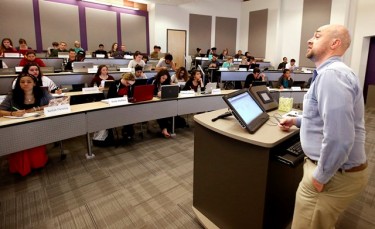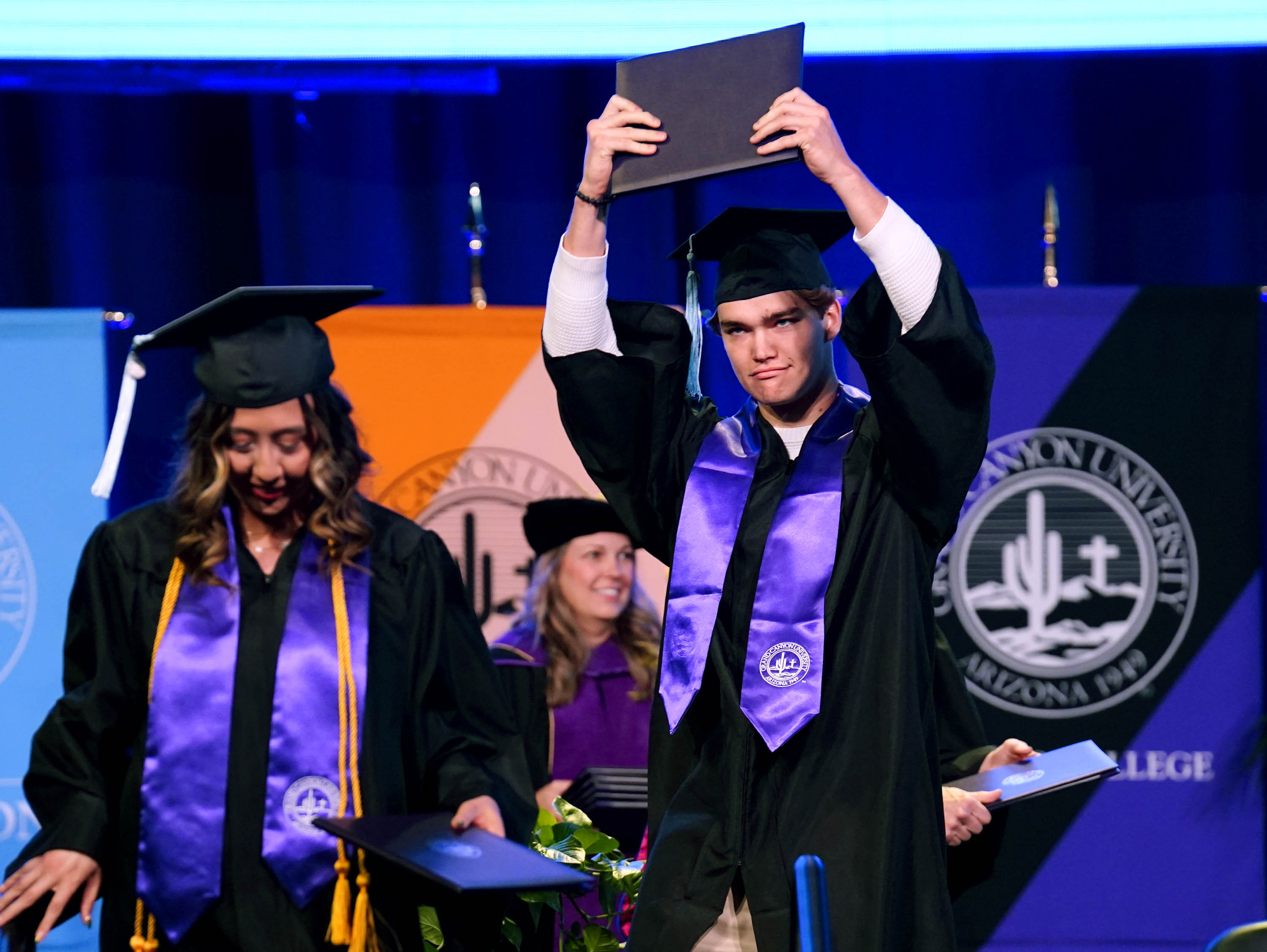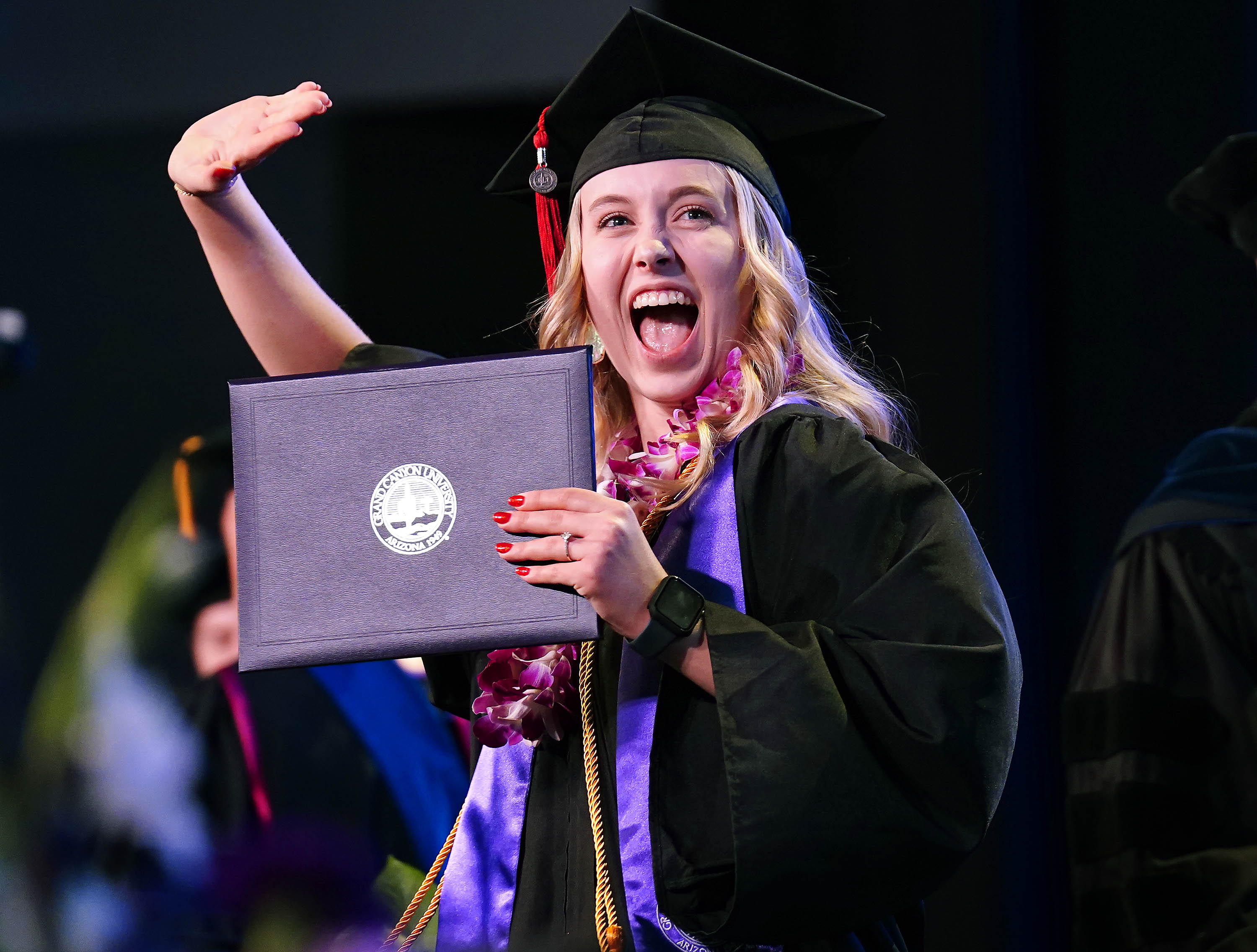Story by Cooper Nelson
GCU Today Magazine
During his Tuesday afternoon Math 134 class, Grand Canyon University professor Dr. Filippo Posta lectures on algebra and calculus to more than 80 freshmen and sophomores. Many of the concepts he covers are refreshers from high school classes.
On Thursday, a fraction of the students attend class, trickling in late and staying for a half-hour at most. Many spend time doing homework on laptops. But Posta doesn’t seem to mind. He floats around the room, answering questions.
Posta’s class is among several traditional undergraduate classes that are part of a new blended learning format that GCU, as it explores ways to combine elements of traditional and online courses, piloted this year. In the format, students meet for ground classes once or twice a week and complete homework assignments online, using the extra class day for tutoring or study time. Other blended courses include Psychology 102, Physics 111, Biology 220 and Biology 483.
Through the College of Humanities and Social Sciences, the blended learning concept was first introduced over the summer in Posta’s Math 110 course as a way to reinvent 100-level classes to be more engaging and valuable as core degree courses. GCU is a leader in online education with more than 55,000 students and 200 online full-time faculty members and also has a burgeoning traditional enrollment of nearly 11,000.
Provost Dr. Hank Radda said the blended program may not apply to every class. But the University hopes to use the concept to improve the quality of general education courses and provide students a greater depth of online learning.
“We’re always trying to do our best to improve learning and learning outcomes for our students,” Radda said. “We have experienced teachers who have a willingness to explore blended learning and a desire to improve the pedagogical experience and make learning better for students. GCU is the perfect playground because it is essentially already a blended university, being a pioneer with online and ground.”
Better work habits, application, grades
In blended courses, students receive the same lectures as they would in 100-level classes but are given personal online assignments, called asynchronous learning experiences. These assignments cater to students’ careers or post-college life.
Posta’s 20-student summer math class met for lectures Monday and Friday and received online assignments Wednesday to be completed by Friday. The aim was to curb procrastination among students and prevent them from having assignments due on the weekends.
In one assignment, Posta asked students to calculate their expected annual incomes based on their careers, then deduct federal and state taxes. Other assignments involved Excel problems, such as creating spreadsheets for hypothetical financial positions or recording and compiling information from database searches.
Students in the blended summer course received 60 percent more A’s than in previous summer classes, and there were no failures or dropouts. Posta credits the stronger grades to the personal application of blended learning practices.
“The way general ed math classes are set up, there is a lot that is asked of the student to do procedurally but there aren’t as many concepts,” said Posta, who teaches three ground classes, including the blended class, and one online course. “Blended provides a better approach because we are able to cover the procedural stuff in the lecture and expand on the concept by providing applications to the future careers of the students.
“Giving each student a way to explore algebra in their career, I found that students embraced that,” he added. “They were happy they didn’t have to come to class one day, but they were also more engaged in class and actually working harder.”
Blended learning helped GCU sophomore Francisco Quijada, a health care administration major, readjust to school after four years away and two military tours in Afghanistan.
Quijada, 23, entered the Marines after high school and took his first semester of college classes last summer. He said the personal application of the blended class helps him better understand unfamiliar math concepts.
“I like that it is applicable to my career. Basic math sometimes doesn’t always apply to what you want to do after college, but with this it does,” he said. “It is a helpful way to readjust. The teachers are there to help you, but you can pick it up as you go.”
A national trend
Blended education. Flipped classroom. Hybrid learning. Blended learning is known by many names and is widely misunderstood.
In elementary classrooms and college lecture halls, the concepts are the same — applying technology and online learning and interaction in the classroom — but the application varies. Students submit assignments online and often have online discussions while also meeting daily in class to hear lectures and view notes on PowerPoint.
GCU biology professor Tina Salata asks her Biology 220 students to research their carbon footprints online and present their findings to the class. Physics 111 instructor Klaus Mortensen posts sample problems and narrates PowerPoint presentations for students to review during online class days. Instructors meet monthly to discuss best practices and compile data to apply to future classes and determine where blended applies and where it doesn’t fit.
Dr. Sherman Elliott, dean of the College of Humanities and Social Sciences, said the University is encouraging students to bring laptops to class.
“Our students grew up with smart phones in their hands, tablets, PCs, Macs. So instead of trying to keep those things out of the classroom we’re encouraging them to bring them in,” Elliott said. “Everything is done on computers now, so why not learning, too? “This is the best of both worlds.”
Radda said more GCU classes could have a blended element, but future application will be based on the results of the pilot programs, which extended to English and marketing courses this spring.
“What we’re finding is that blended can be as good if not better than traditional and online and better in certain areas,” Radda said. “We’re always questioning what we are doing well and what can we improve. That’s just who we are.”
Contact Cooper Nelson at 602-639-7511 or [email protected].




